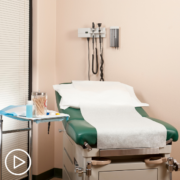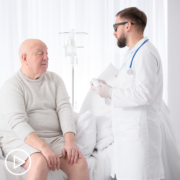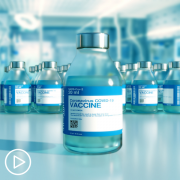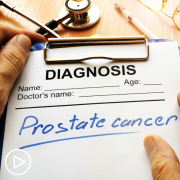Emerging Promising Advanced Prostate Cancer Treatments
Emerging Promising Advanced Prostate Cancer Treatments from Patient Empowerment Network on Vimeo.
What emerging advanced prostate cancer treatments are showing promise? Expert Dr. Yaw Nyame with the University of Washington shares his perspective about the treatment landscape, updates on clinical trials showing promise, and how to help ensure optimal patient care.
See More from [ACT]IVATED Prostate Cancer
Related Resources:

|

What Impact Does Advanced Prostate Cancer Have on Lifestyle? |

Advanced Prostate Cancer Diagnosis and Survival | Black and Latinx Disparities |
Transcript:
Lisa Hatfield:
Can you speak to the current treatment landscape and any new research coming out about advanced prostate cancer treatment that you are excited about? And how do you work with your patients to make treatment decisions, particularly those in underrepresented communities?
Dr. Yaw Nyame:
So, two very different questions. The first thing I’ll say is the landscape is changing, and there are a lot of exciting things. There are some trials that are showing that the combination of systemic therapies like the hormone blockade, whether it be hormone blockade at a large level, at the cell level with some of those novel agents like abiraterone (Zytiga) and enzalutamide (Xtandi) or even chemotherapy, how we combine those are all very exciting. But we also know that local control of the prostate, so either using radiation to the prostate, which was shown to be beneficial in a clinical trial from the UK called STAMPEDE, we have an ongoing clinical trial called SWOG 1802, which is looking at whether surgery locally to the prostate can add additional benefit to men with advanced prostate cancer.
So I think it’s exciting to understand how we can improve survival. It used to be around three-year survival for prostate cancer when you were diagnosed with advanced forms. We’ve moved that to beyond five years because of how many incredible new advances we have and these combinations of local therapy and systemic therapy. We also have new drugs coming into the landscape like lutetium Lu 177 vipivotide tetraxetan (Pluvicto), which is a PSMA tagged radioligand which has, you know, shown some really great results in the castration-resistant or hormone resistant space that’s being tested now earlier in the hormone sensitive space and high risk localized space.
So there are a lot of really fantastic and exciting new advances. I’m skipping over other types of medications that are really in the precision oncology space, like the PARP inhibitors which are shown to be beneficial in people who have, you know, certain genetic, you know mutations and DNA recombination.
So I think we continue to see evolution in this space where, you know, we used to sort of see this cancer as a one size fits all. And you know, we sort of try to sometimes hit a square peg into a round hole, and now we’re able to really say, okay, your cancer has these features and this combination of things is what’s going to work best. But the problem with that is the more nuanced and the more personalized our care gets, the more opportunity there is for people who are on the margins to be lost.
And so, you know, our historically, you know, marginalized and minoritized populations are sometimes going to be the ones at highest risk for not getting the latest and greatest. One of the things that I’m really interested in supporting and seeing supported in cancer centers and in clinical sites across the country is patient navigation.
Providing services that help people get connected to all the different types of doctors, all the different types of institutions that might offer them the treatments and the workups that they need to make sure that they get access to the best care that’s available. And that’s not only supporting the patient oftentimes, but that’s supporting their caregivers, their families, and making sure that what is a really complex process. It’s not just going in for one doctor’s visit oftentimes, right?
Seeing a lot of different specialists, getting a lot of different tests. But that process is supported for people that have especially among people that have significant social needs and may not be able to navigate that on their own. My activation tip in this space is to absolutely do your homework and find resources to help you navigate this very confusing and very busy landscape when you have your diagnosis.
A lot of cancer centers have patient navigators, okay? And if they don’t, they should. So that is one resource that you should not be afraid to ask for and utilize is someone from the doctor’s office. That’s just going to take the time to make sure if you need to be connected to an insurance, you know agency like Medicare or Medicaid, that you’re connected, that if there are certain appointments you need to make, that they help you schedule and if you need transportation support, that they help connect you to that. And so finding those resources, whether it’s through your community and peer network or through the cancer center, is really important to make sure that you can get as comprehensive of care as you can.
Sherea Cary:
My activation tip for care partners when addressing things like treatment and new research is for the care partner to be as informed as possible about other health issues that the patient may have, and to be transparent with the oncologist about what other things are going on in the patient’s life to make sure that they fit some of the new research that’s coming out or be able to, or the patient and the care partner are able to overcome those barriers that may separate them in some of the treatment decisions.
Lisa Hatfield:
Right, thank you both Dr. Nyame and Sherea, who is a care partner. Thank you for that. Those activation tips.















